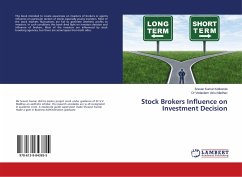
Do Commissions and Boni affect advisor behaviour?
An Online Experiment Using Amazon Mechanical Turk
Versandkostenfrei!
Versandfertig in 6-10 Tagen
30,99 €
inkl. MwSt.

PAYBACK Punkte
15 °P sammeln!
Modern households have a great responsibility to deal with their own saving and investment decisions. Unfortunately, since the financial market has become more sophisticated and financial products more complex, investors usually lack the knowledge to meet these challenges. Therefore, they increasingly rely on experts help to make investment decisions. The information asymmetries, paired with the fact that financial advisors mostly rely on incentive pay as their main source of income, can lead to inefficies in those markets, if those incentive payments truely distort advisors' recommendations. ...
Modern households have a great responsibility to deal with their own saving and investment decisions. Unfortunately, since the financial market has become more sophisticated and financial products more complex, investors usually lack the knowledge to meet these challenges. Therefore, they increasingly rely on experts help to make investment decisions. The information asymmetries, paired with the fact that financial advisors mostly rely on incentive pay as their main source of income, can lead to inefficies in those markets, if those incentive payments truely distort advisors' recommendations. In order to test, first, whether advisors are receptive to different forms of incentive pay, and second, which of the two instruments is more effective in distorting advice, I conduct an online experiment which is presented in this book.












